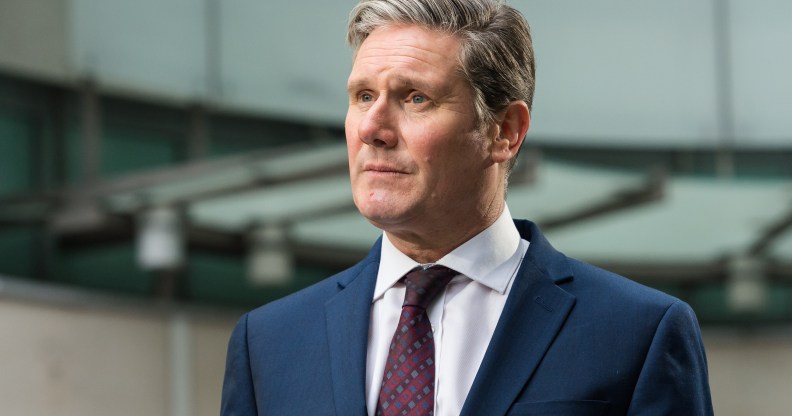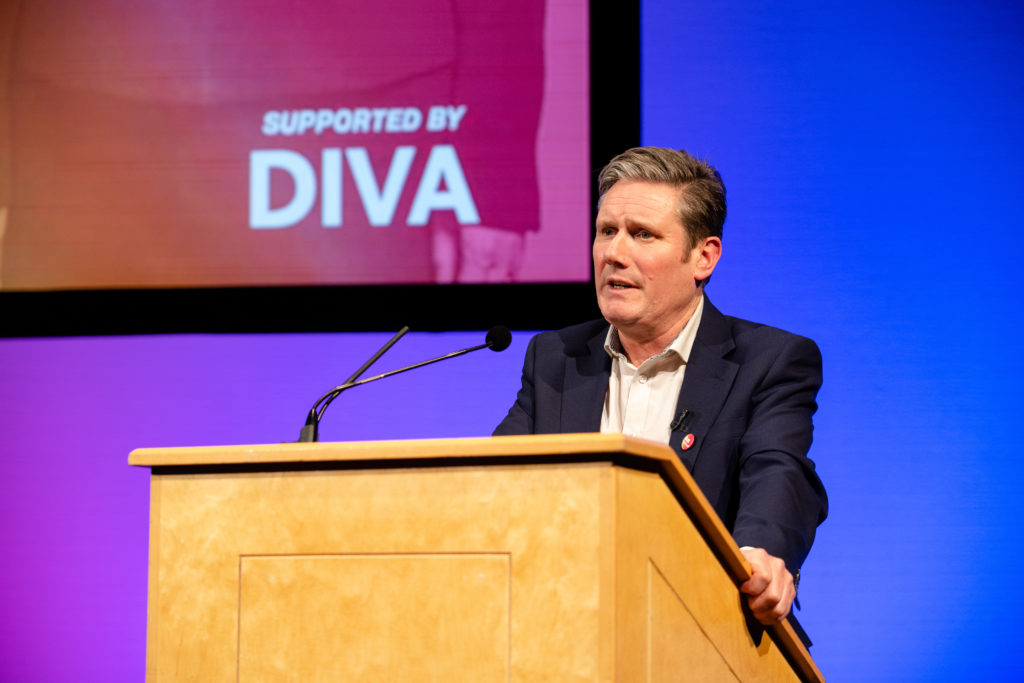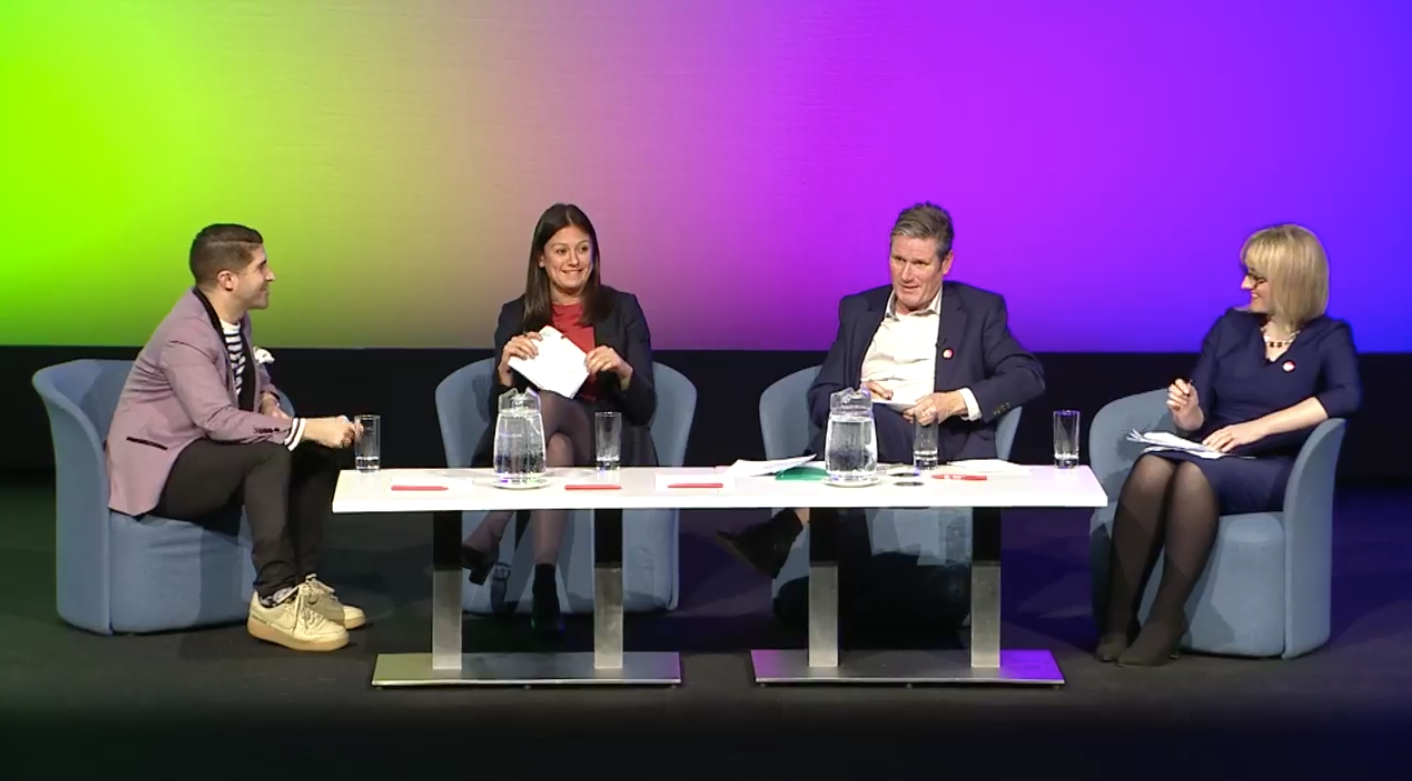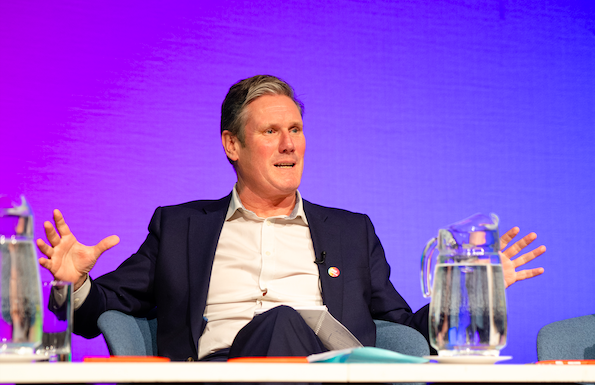Keir Starmer on a storied career spent fighting for LGBT+ rights and standing shoulder to shoulder with the trans community

Keir Starmer has come under fire for saying that 16 is too young for someone to change their gender (Getty)
As the Labour leadership election begins in earnest and Keir Starmer remains the firm frontrunner, it’s looking more likely than ever that he will become the next leader of the opposition.
The shadow Brexit secretary is going head-to-head against Lisa Nandy and Rebecca Long-Bailey as he seeks to unite a party that is still deeply fractured in the wake of the general election.
If Keir Starmer is successful in doing this he then has the unenviable challenge of restoring public confidence in the party ahead of the next general election. It’s certainly no small feat – but one area he should be on firm ground with is fighting for LGBT+ rights.
Keir Starmer, 57, only entered parliament in 2015 as MP for Holborn and St Pancras, but he has a long career in social justice, having previously worked as a human rights barrister.
He’s worked for the Human Dignity Trust, which challenges Commonwealth laws that penalise people for being LGBT+, and been a key figure on legal battles to abolish the death penalty for homosexuality in the Caribbean and Africa. He’s also served as human rights adviser to the Northern Ireland Policing Board and led the Crown Prosecution Service until 2013.
In this role Keir Starmer brought the successful prosecution against two men accused of murdering black teenager Stephen Lawrence, and in 2014 he was knighted for services to law and criminal justice.
How will he bring these strengths to the Labour party as leader, and what will that mean for the UK’s LGBT+ community? PinkNews got a glimpse at the LGBT+ Labour leadership hustings in February.

Keir Starmer giving his closing statement at the LGBT+ Labour leadership hustings, presented by PinkNews
PinkNews: When did LGBT+ rights first become a part of your political agenda?
Keir Starmer: A long time ago. One of my closest friends at school came out when he was 15, and I still remember the response of his dad: ‘You’re no son of mine.’ And he just cut him off there, the evening that he told him. For my friend it was really traumatic, and being a friend of his I sort of lived through that with him. And that relationship [with his father] never ever repaired – that suddenly his dad one day, proud of his son, the next day, completely shut him off. It was a bit of a shock to him but it was a bit of a shock to me as well, and so for a long time that stayed with me.
So that’s followed you throughout your life?
Yeah. When I went to university I went into human rights law and became a human rights lawyer, and that went into my work. It was that human experience, if you like, that was very, very powerful for me.
What do you think is one of the biggest issues that’s facing the LGBT+ community in 2020?
I think it’s constantly having to risk-assess different situations every day – are we safe? And that manifests in different ways, whether it’s in a debate, hate crime, physical attacks. That seems to me to be still a massive issue.
As Labour leader, what steps would you take to challenge the vilification of trans people in the media? And how would you educate people within the Labour Party and the wider population who still hold anti-trans views?
The Labour Party stands up for people who are being abused and vilified, and we always will we always should. Trans rights are human rights and I support the right to self identification. The Gender Recognition Act was a step in the right direction, but it doesn’t go far enough. Other countries have now gone past us with more rights; therefore, it does need extending. I agree about the dehumanising aspects of the [gender recognition] process. But we want to have this debate in the right spirit. I don’t think it helps to have too heated a debate about it, it must be possible to move forward in the right spirit.
The media’s role in this is really, really important because they’re amplifying some of the hatred. And I see the echoes of Section 28. The same arguments, the same examples that were used when we were battling Section 28 are now being used in a different context. And just as we battled it then, so we have to battle it now. I think we will look back at this period, at some of the media coverage in particular, and be ashamed of what’s gone on, just as we’re ashamed of what went on when we were battling Section 28. So that’s how I would approach it as a leader of the Labour Party.
Populism is on the rise around the world. How would you counter this threat and safeguard LGBT+ people without falling into the trap of mainstreaming some of the views?
I don’t particularly like the phrase populism. It is right-wing politics, but it is there, it is on the rise across Europe, the UK, and you can see it in America as well. We know that one in five members of the LGBT+ community experienced a verbal or physical attack in the past year, and the numbers are going up.
When I was in charge of the Crown Prosecution Service we worked hard to drive the numbers up for hate crime because we wanted more people to feel safe to report what was happening to them. I still think there’s many, many people who are not reporting what is happening to them. We do need a strong response to [hate crimes] and I agree that it should be an aggravated offence. The difference between having something that could increase the sentence and making it an aggravated offence is that the police then have to investigate what the motive was for the attack, and it becomes part of the offensive part of the prosecution. And that is very, very important in all of this, and of course, we need continually to have more training for the police and prosecutors to make sure they’re taking these cases through.

Keir Starmer with Lisa Nandy and Rebecca Long-Bailey at the LGBT+ Labour leadership hustings, presented by PinkNews
PinkNews: You have worked on a lot of international human rights cases. How do we evoke those changes in LGBT+ rights internationally?
Keir Starmer: One of the cases I was involved in in the early stages was the challenge in Jamaica [against the criminalisation of homosexuality], and there’s two incredible individuals, Gareth Henry and Simone Edwards who are the claimants in that case. Not only have they taken on the challenge, but they’ve put it to the Inter-American Commission [of Human Rights], which is really important because if they win there they will get a ruling that will apply to all the countries within the Inter-American Commission. We’re quite focused on LGBT+ rights in Europe and the very many success they’ve had there, this is now happening in the Inter-American Commission and that’s really important.
How should LGBT+ rugby fans and allies greet the Australian rugby player Israel Folau when he’s over here playing against British teams?
Call him out! It’s so important, not only because the views are completely awful but it’s the culture within sport. I am a football fan, and it’s still really hard for people within football to come out because the culture is completely wrong. So it’s not just what he says, he’s also reinforcing a culture that makes it really difficult for people. So call him out.
Do you think that any state-funded school should be able to opt out of LGBT-inclusive sex and relationships education?
Absolutely no opt-outs on this. This is so, so important that you should not be allowed to opt out on this. To not have full sexual relations education means you’re not putting up an accurate and true reflection of society and relationships before young people. You’re not really educating them at all. So there should be no opt-out here at all.
In 2019 the Tories promised they were going to help teachers tackle bullying, which includes homophobic bullying. If a school child was to call someone a ‘tank-topped bum boy‘, what do you think the punishment should be?
It depends on the age, but I think the best punishment would actually be a reflective session with the teacher, because actually, opening minds and having that discussion would be far better than anything else.
What’s your favourite memory of a Pride parade?
Last year, Camden council went to Pride in London for the first time together and it was really really brilliant, because it got all the different politicians, all the staff all there in one go. It was very, very positive, and as soon as I arrived they put glue on my cheeks and splattered me with glitter. Fantastic.
OK, now for quite a divisive question – Madonna or Cher?
Oh, crikey. Neither. Or both!
PinkNews: Who’s your personal gay icon?
Keir Starmer: Well, I’m going to go for Gareth Henry and Simone Edwards [in Jamaica], because I think they’re just amazing in what they’re doing. They’re very brave – Simone has been shot at and Gareth has had death threats galore, such that neither of them can actually live back in the country they want to live in, with their families and their communities. You do get these individuals in history who take on a case that obviously matters to them as individuals but also is strategic in the sense that if they win that it wins for the whole community. If that is won it’ll be a huge step forward.
Now I want you to imagine that you’re in a gay bar…
Don’t have to imagine it, I’ve been in one many times!
What are you ordering at the bar and what song is it going to take to get you on the dance floor?
A pint of lager. And what’s going to get me on the dance floor? I don’t know… “Sweet Caroline.”
This article is formed from a series of questions put to Keir Starmer both on and offstage at the LGBT+ Labour leadership hustings, presented by PinkNews.


